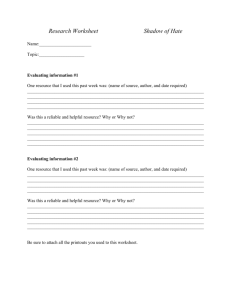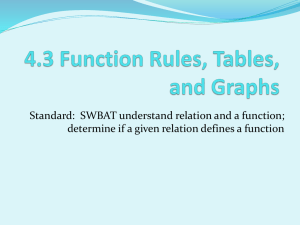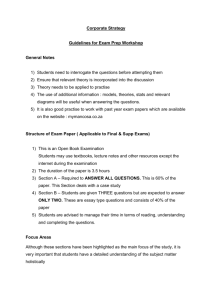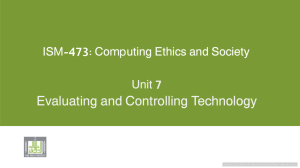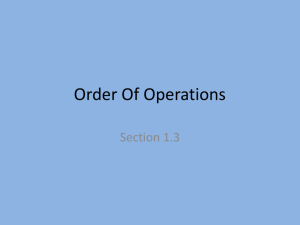So how do I evaluate a Web source?
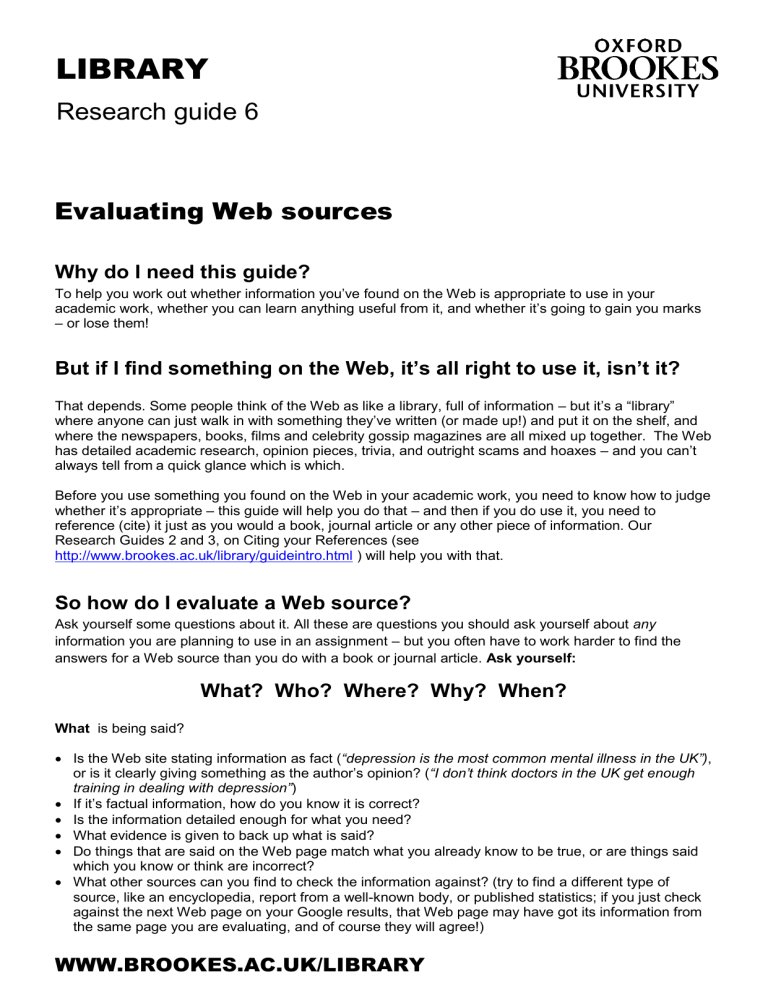
LIBRARY
Research guide 6
Evaluating Web sources
Why do I need this guide?
To help you work out whether information you’ve found on the Web is appropriate to use in your academic work, whether you can learn anything useful from it, and whether it’s going to gain you marks
– or lose them!
But if I find something on the Web, it’s all right to use it, isn’t it?
That depends. Some people think of the Web as like a library, full of information – but it’s a “library” where anyone can just walk in with something they’ve written (or made up!) and put it on the shelf, and where the newspapers, books, films and celebrity gossip magazines are all mixed up together. The Web has detailed academic research, opinion pieces, trivia, and outright scams and hoaxes – and you can’t always tell from a quick glance which is which.
Before you use something you found on the Web in your academic work, you need to know how to judge whether it’s appropriate – this guide will help you do that – and then if you do use it, you need to reference (cite) it just as you would a book, journal article or any other piece of information. Our
Research Guides 2 and 3, on Citing your References (see http://www.brookes.ac.uk/library/guideintro.html
) will help you with that.
So how do I evaluate a Web source?
Ask yourself some questions about it. All these are questions you should ask yourself about any information you are planning to use in an assignment – but you often have to work harder to find the answers for a Web source than you do with a book or journal article. Ask yourself:
What is being said?
What? Who? Where? Why? When?
Is the Web site stating information as fact ( “depression is the most common mental illness in the UK”) , or is it clear ly giving something as the author’s opinion? ( “I don’t think doctors in the UK get enough training in dealing with depression” )
If it’s factual information, how do you know it is correct?
Is the information detailed enough for what you need?
What evidence is given to back up what is said?
Do things that are said on the Web page match what you already know to be true, or are things said which you know or think are incorrect?
What other sources can you find to check the information against? (try to find a different type of source, like an encyclopedia, report from a well-known body, or published statistics; if you just check against the next Web page on your Google results, that Web page may have got its information from the same page you are evaluating, and of course they will agree!)
WWW.BROOKES.AC.UK/LIBRARY
Does the Web page itself give sources for the information – does it say where it came from?
If the Web page is clearly giving someone’s opinion on an issue, how much weight should you give to their opinion? That leads us on to our next question…
Who is saying it?
Can I trust the person or organisation behind this Web page? Are they likely to have their facts right?
Are they likely to be biased? Are they an authoritative source? (Being near the top of Google’s search results is no guarantee of any of these things!)
Can you easily tell who the person or organisation behind the Web page is?
Are they a recognised authority on the subject? (do other sources you have read, such as books or journal articles, refer to them? Had you heard of them before?)
Is there a bibliography of articles, reports, books or other publications by the person or organisation on the Web site, to show you how much they have published?
Where are they from?
If you found the page through a link or a Web search, and are not sure where it comes from, look for the home page, or an “About Us” or similar link.
Does the page author give a real-world postal address and phone number?
Does the type of Web address the site has tell you anything about the authors? For example, Web addresses ending .ac.uk
are hosted by UK higher education: addresses ending .edu
belong to US educational institutions; .gov
in a Web address indicates a Government site, and .org
is usually used by nonprofit organisations. This isn’t foolproof, but it gives you some idea of what kind of organisation or individual might be behind a Web site.
Why are they saying it?
Once you know Who is behind the Web page and Where they are from, you can ask yourself what agenda the authors might have and therefore how that might bias the information.
For example, if you have found information on a particular drug – is the Web page produced by the company which makes the drug, in which case they will be trying to promote their product? By a campaign group trying to get the drug banned, who would present as much negative information as they could? Or from an independent research institute, which would be more likely to be objective?
When does this information date from?
Given how quickly information on the Web can change and how long some Web sites have been around, always try to check how up-to-date the information is.
Does the page say when it was last updated? (If not, try checking the Properties or Page Info options in your Web browser for a date)
Is the Web site generally being maintained – do all the links still work?
Can you check against sources you know are up-to-date for comparison?
Answering all the above questions should help you decide how trustworthy the information is and how appropriate it is t o use it in your work. Don’t forget – if you use it, cite it!
To help you track down reliable information on the Web , instead of going straight to Google use the subject gateways at PINAKES , which are put together by subject experts: http://crl.du.ac.in/Subject%20Gateways%20for%20DU%20site.html
Or look on the Brookes Library Subject Help pages ( http://www.brookes.ac.uk/library/subject.html
) for your area
– each subject’s Web pages include a section on recommended Internet sites.
Hazel Rothera, Subject Team Leader, May 2014
Further information on evaluating Internet and web resources:
Web sites:
Ayers, Phoebe (2008). How to evaluate a Wikipedia article . Available at: http://upload.wikimedia.org/wikipedia/en/1/16/How_to_evaluate_a_Wikipedia_article.pdf
(Accessed: 27
May 2014) - while most courses will not recommend you use Wikipedia for primary research , if you do use it as a “presearch” starting point, this article gives good tips on judging quality and reliability.
Grassian, Esther (2011). Thinking critically about Web 2.0 and beyond . Available at: http://www.library.ucla.edu/libraries/college/thinking-critically-about-world-wide-web-resources
(Accessed: 27 May 2014) - a detailed checklist for evaluating Web resources , with a new guide to critically evaluating and using information from social networking sites.
Intute (2006). Internet detective.
Available at: http://www.vtstutorials.ac.uk/detective/ (Accessed: 27 May
2014) - a really useful and light-hearted step-by-step tutorial to teach you how to weigh up “The
Good, The Bad and The Ugly” in Web resources.
Tutorpro (2011). Virtual training suite.
Available from: http://www.vtstutorials.co.uk/ (Accessed: 27 May
2014) - originally produced by Intute and now maintained by Tutorpro, these Internet subject tutorials each have a section on evaluating the quality of material you find on the Web .
Books: ( Brookes Library holds all these - check the Library Catalogue for location information)
Blakeman, Karen (2004). Search strategies for the Internet. 5 th ed. Caversham: RBA Information
Services. ( Part 6, “Assessing the quality of information” gives helpful suggestions on identifying a Web site’s authors and what authority they have.)
Clegg, Brian (2006). Studying using the web : the student's guide to using the ultimate information resource.
London: Routledge. ( Chapter 6, “Who do you trust?” is very helpful on evaluating the authority of a Web site.)
Cooke, Alison (2001). A guide to finding quality information on the Internet: selection and evaluation strategies . 2 nd ed. London: Library Association Publishing. (Chapters 3 to 5 cover evaluation of sources.)
Ford, Nigel (2012). The essential guide to using the Web for research. Los Angeles: Sage. (Chapters 4-7 are on the importance of identifying quality information on the Web and what tools can help you find it.)
Munger, David (2007). What every student should know about researching online. London: Pearson
Longman. (Chapter 3 is on evaluating web sources).
O Dochartaigh, Niall (2012). Internet research skills . 3 rd ed. Los Angeles: Sage. (Detailed, helpful guide to finding free and paid-for Web resources for academic research.)
Radford, Marie, et al (2006) Web research: selecting, evaluating and citing . 2 nd ed. Boston: Pearson.
(Good basic book on using the Web for research; Chapter 3 is on content evaluation.)
Hazel Rothera, Subject Team Leader, May 2014
